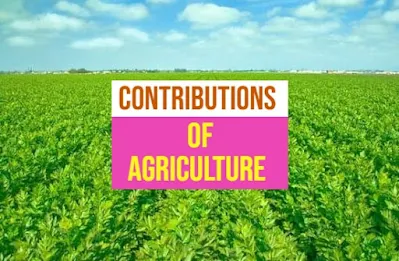Agriculture has historically played a significant role in economic development and continues to be an important sector in many economies today. Agriculture will continue to be an important source of economic opportunity and growth in the future, particularly in developing regions where it is often the main source of livelihood for a large portion of the population. Policymakers, farmers, and other stakeholders need to work together to maximize the potential of agriculture to contribute to economic development, while also ensuring that it is sustainable and supports the well-being of communities and the environment.
Key Contributions of Agriculture to Economic Development
Generating employment
Agriculture provides employment opportunities for a significant portion of the population, particularly in rural areas. This can help to reduce unemployment and poverty levels and contribute to the overall economic growth of a country. Agriculture provides jobs to millions of people around the world, from farmers and farm workers to those employed in the processing, distribution, and marketing of agricultural products.
$ads={1}Increasing food security
Agriculture is essential for providing food for the population, both domestically and for export. This can contribute to improved health and well-being, as well as reduce the burden of food imports on a country's economy. Agriculture plays a critical role in ensuring food security, both nationally and globally. Without a reliable and sustainable food supply, economic growth and development are compromised.
Generating foreign exchange
Agricultural exports can generate foreign exchange for a country, which can be used to finance imports and other development projects. This can help to stabilize a country's economy and reduce its reliance on external sources of funding.
Providing raw materials for other industries
Agriculture is a source of raw materials for a wide range of industries, including textiles, pharmaceuticals, and biofuels. This can help to stimulate industrial development and create new employment opportunities.
Supporting rural infrastructure
Agriculture can be a catalyst for the development of rural infrastructure, including roads, irrigation systems, and storage facilities. This can improve access to markets and services, and help to reduce rural poverty.
Encouraging technological innovation
The agricultural sector is a source of technological innovation, as farmers and researchers work together to develop new crop varieties, irrigation methods, and farming techniques. These innovations can spill over to other sectors of the economy, leading to increased productivity and economic growth.
Stimulating rural development
Agriculture can be an important driver of rural development, as it provides income and employment opportunities that can support other businesses and services. This can help to create more vibrant rural communities and reduce urban migration.
Contributing to trade liberalization
Agricultural trade can be a powerful tool for promoting trade liberalization and economic growth, as countries work together to reduce barriers to trade in agricultural goods. This can increase competition, lower prices, and increase consumer welfare.
Fostering sustainable development
Agriculture can be a source of sustainable development, as farmers and policymakers work together to develop practices that conserve natural resources and protect the environment. This can help to ensure that future generations can continue to benefit from the economic opportunities provided by agriculture.
Supporting social and cultural development
Agriculture can be an important source of social and cultural development, as it provides opportunities for people to connect with their communities, maintain traditional practices, and celebrate cultural heritage. This can help to promote social cohesion and create a sense of shared identity and purpose.
Diversifying the economy
Agriculture can be a source of economic diversification, particularly for countries that are heavily dependent on natural resource exports. Diversifying the economy can help to reduce vulnerability to external shocks and contribute to long-term economic growth.
Promoting entrepreneurship
Agriculture can be a source of entrepreneurship, as farmers and other agricultural workers develop new business models and value-added products. This can create new employment opportunities and support innovation and growth in the broader economy.
Supporting human capital development
Agriculture can be an important source of human capital development, particularly for rural communities. It provides opportunities for education and training, as well as hands-on experience that can develop skills and increase productivity.
Promoting health and well-being
Agriculture can have a positive impact on health and well-being, as it provides access to fresh, nutritious food and outdoor physical activity. This can lead to improved health outcomes, including reduced rates of obesity, diabetes, and other diet-related illnesses.
Contribution of Agriculture to the Economy
Agriculture plays a significant role in the economy of many countries around the world, contributing to employment, income, and GDP. Here are some of the key contributions of agriculture to the economy:
Income
Agriculture is a source of income for many people, particularly in rural areas, where it is often the main source of livelihood. Income generated from agriculture can be used to support education, healthcare, and other basic needs.
GDP
Agriculture contributes to the Gross Domestic Product (GDP) of many countries, particularly those with a high share of agricultural output. In some countries, agriculture is the largest sector of the economy and many agriculture companies in the world are operating.
Contributing to disaster resilience
Agriculture can be an important source of disaster resilience, as farmers and communities develop strategies to cope with natural disasters such as droughts, floods, and storms. This can help to reduce the impact of disasters on livelihoods and contribute to long-term economic stability.
The contributions of agriculture to economic development are varied and complex, including generating employment with agriculture business, increasing food security, generating foreign exchange, providing raw materials for other industries, supporting rural infrastructure, encouraging technological innovation, stimulating rural development, contributing to trade liberalization, fostering sustainable development, supporting social and cultural development, diversifying the economy, promoting entrepreneurship, supporting human capital development, promoting health and well-being, and contributing to disaster resilience.

